
BMW 8 Series 2020 review: M850i Gran Coupe long-term
One of BMW's fastest four-doors is actually a coupe. You may not agree with the nomenclature, but its had to argue with the idea of spending three months with an M850i Gran Coupe in the garage.
Browse over 9,000 car reviews

It’s a good thing the Porsche Panamera doesn’t feel emotions. Otherwise it might be feeling like the forgotten member of the Porsche family.
While the 911 remains the evergreen hero, the Cayenne and Macan the popular sales darlings and the new Taycan the exciting newcomer, the Panamera simply plays its part.
It fills an important but small role for the brand, giving Porsche an executive sedan (and wagon) to compete against the big players from the other German brands - Audi A7 Sportback, BMW 8-Series Gran Coupe and Mercedes-Benz CLS.
However, while it may have been overshadowed of late, that doesn’t mean Porsche has forgotten about it. For 2021 the Panamera has been given a mid-life update, after this current generation launched back in 2017.
The changes are subtle in isolation but add up to some big improvements across the range, most notably extra power has seen the previous range-topper, the Panamera Turbo, become the Turbo S.
There’s also a new hybrid model and tweaks to the air suspension and related systems to improve the handling (but more on that later).
| Porsche Panamera 2021: (base) | |
|---|---|
| Safety rating | |
| Engine Type | 2.9L turbo |
| Fuel Type | Premium Unleaded Petrol |
| Fuel Efficiency | 8.8L/100km |
| Seating | 4 seats |
| Price from | $169,620 |
The biggest news in terms of pricing for this updated model is Porsche’s decision to cut the cost of entry - significantly.
The entry-level Panamera now starts at $199,500 (before on-road costs), which is more than $19,000 cheaper than previously. Even the next model up, the Panamera 4 costs less than the previous cheapest model priced from $209,700.
There’s also the Panamera 4 Executive (long wheelbase) and Panamera 4 Sport Turismo (wagon), which are priced at $219,200 and $217,000, respectively.
All four of those models are powered by the same 2.9-litre twin-turbo V6 petrol engine, but as the names imply the standard Panamera is rear-wheel drive only while the Panamera 4 models get all-wheel drive.
Next up is the hybrid range, which combines the 2.9-litre V6 with an electric motor for more performance and greater fuel efficiency.
It starts at $245,900 for the Panamera 4 E-Hybrid, the stretched Panamera 4 E-Hybrid Executive costs $255,400 and the Panamera 4 E-Hybrid Sport Turismo will set you back $253,200.
There’s also a new addition to the hybrid group, the Panamera 4S E-Hybrid, which starts at $292,300, and gains the ‘S’ thanks to its more powerful battery that increases its driving range.
The rest of the extensive line-up includes the Panamera GTS (from $309,500) and Panamera GTS Sport Turismo ($316,800). These are powered by 4.0-litre twin-turbo V8 befitting the role of the GTS as the ‘driver focused’ member of the range.
Then there’s the new range-topper, the Panamera Turbo S, which starts at hefty $409,500 but gets an even more potent version of the 4.0-litre twin-turbo V8.
And, just in case none of those appeal there’s one more to choose from, the Panamera Turbo S E-Hybrid which adds an electric motor to the twin-turbo V8 for the most power and torque in the range. It’s also the most expensive at $420,800.
When the second generation Panamera arrived in 2017 it was widely praised for its design. The new model allowed Porsche’s stylists to tidy up the somewhat puffy design of the original whilst still retaining a clear family link to the 911.
For this mid-life update Porsche has only made some minor nip and tucks rather than a major facelift. The changes centre around the front end, where the 'Sport Design' package that was optional is now standard across the range. It has different air intakes and larger side cooling openings for a more dynamic look.
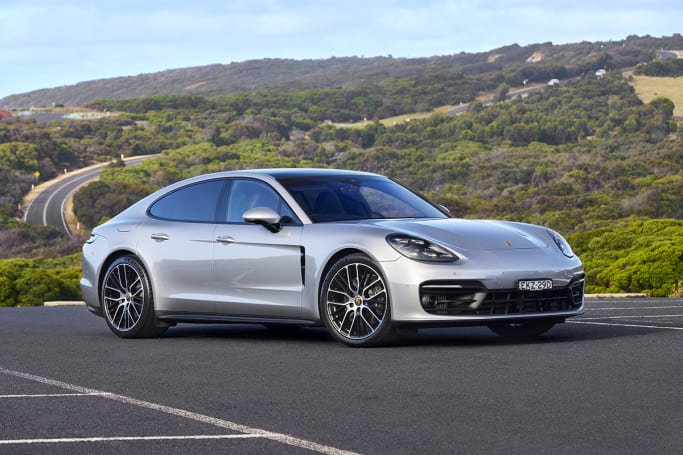
At the rear there’s a new light strip that runs across the boot lid to connect to the LED tail-lights, creating a more seamless appearance.
The Turbo S also gets a unique front end treatment, to further separate it from the previous Turbo. It gets even larger side air intakes that are connected via a body-coloured horizontal element so it stands out from the rest of the range.
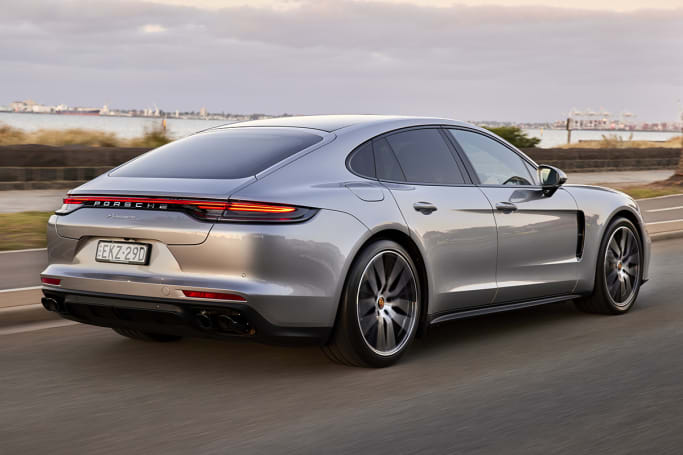
Overall it’s hard to fault Porsche’s decision to not meddle in the design too much. The shape of the Panamera, like a stretched 911 in silhouette, has grown on people over time and the changes they made for the second generation, making it tauter and more athletic in appearance, didn’t need change for the sake of change.
As the limousine of the Porsche family there’s a big emphasis on space and practicality for the Panamera. But there’s a big difference between a Porsche limo and the rest of the German ‘Big Three’, which is why the Panamera’s closest rivals are the sportier A7/8 Series/CLS and not the bigger A8/7 Series/S-Class.
The Panamera isn’t small, stretching more than 5.0m in length, but because of its 911-inspired sloping roofline rear headroom is compromised. Adults under 180cm (5' 11") will be comfortable but anyone taller may find their heads bumping the roof.
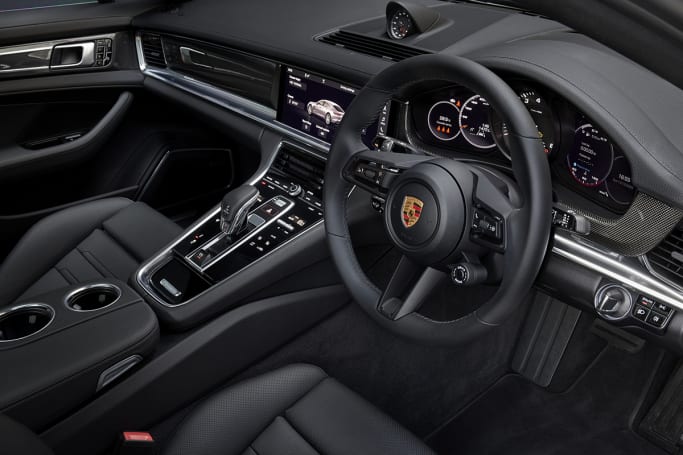
The Panamera is available as both a four- and five-seater, but in a practical sense it would be hard to carry five. The rear middle seat is technically available with a seatbelt but heavily compromised by the rear air-vents and tray that sit on the transmission tunnel and effectively remove anywhere to put your legs.
On the plus side, the outboard rear seats are excellent sports buckets, so they offer great support when the driver exploits the Panamera’s sporty chassis.
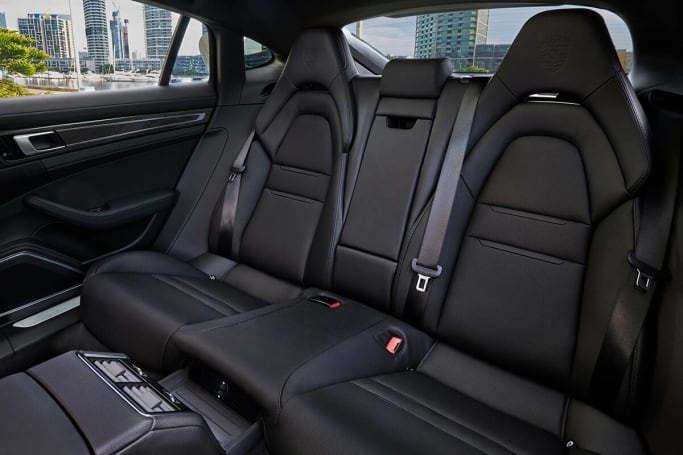
This only applies to the standard wheelbase model, the Executive adds 150mm to its wheelbase which primarily helps create some more rear legroom. But we didn’t get a chance to test that for ourselves on this initial launch drive, so we can’t verify Porsche’s claims.
Those in the front get excellent sports seats across the range, offering lateral support whilst still being comfortable.
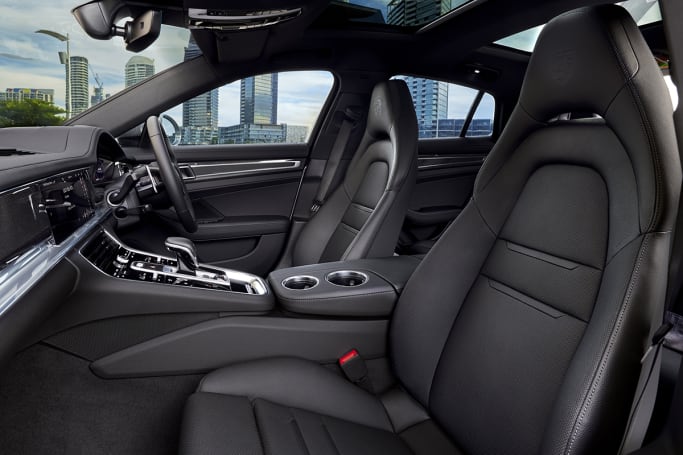
As mentioned earlier there’s a smorgasbord of powertrains for the Panamera range with a variety of V6 turbo, V8 turbo and hybrid variants of both to choose from.
The entry-level model, known simply as Panamera, gets the 2.9-litre twin-turbo V6 making 243kW/450Nm and paired to an eight-speed dual-clutch transmission and sending drive to the rear-wheels.
Step up to the Panamera 4, 4 Executive and 4 Sport Turismo and you get the same engine and transmission but all-wheel drive.
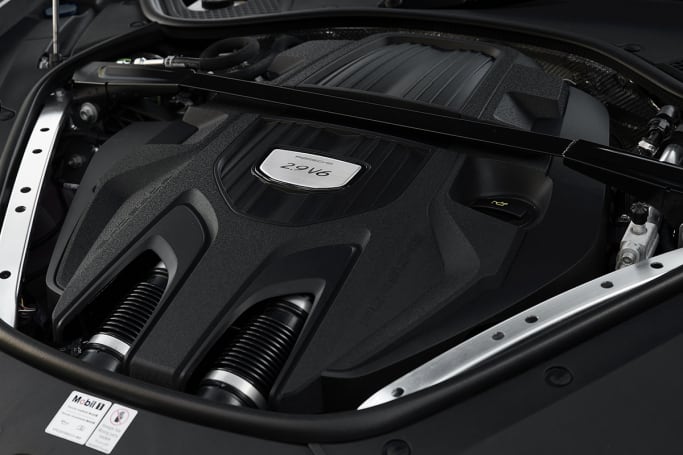
The Panamera 4 E-Hybrid range (which includes Executive and Sport Turismo) has the same 2.9-litre twin-turbo V6 but adds a 100kW electric motor.
That means a combined system output of 340kW/700Nm, driving through the same eight-speed dual-clutch and all-wheel drive system as the non-hybrid variants.
The Panamera 4S E-Hybrid gets an upgraded 17.9kWh battery, replacing the old model’s 14.1kWh version. It also gets a more powerful version of the 2.9-litre V6, tuned to make 324kW, which ups the total output to 412kW/750Nm; again with the eight-speed dual-clutch and all-wheel drive.
The Panamera GTS uses the brand’s 4.0-litre twin-turbo V8 engine, tuned to make 353kW/620Nm, also with the eight-speed ‘box and all-wheel drive.
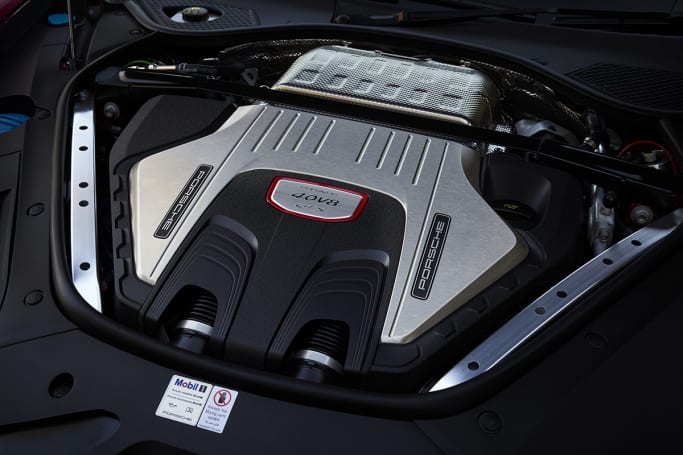
The Turbo S uses the same engine but it gets a new tune to bump performance to 463kW/820Nm; that’s a 59kW/50Nm increase over the old model’s Turbo, hence Porsche’s justification in adding the ‘S’ to this new version.
And if that’s still not enough grunt, the Panamera Turbo S E-Hybrid adds the 100kW electric motor to the 4.0-litre V8 and the combination produces 515kW/870Nm.
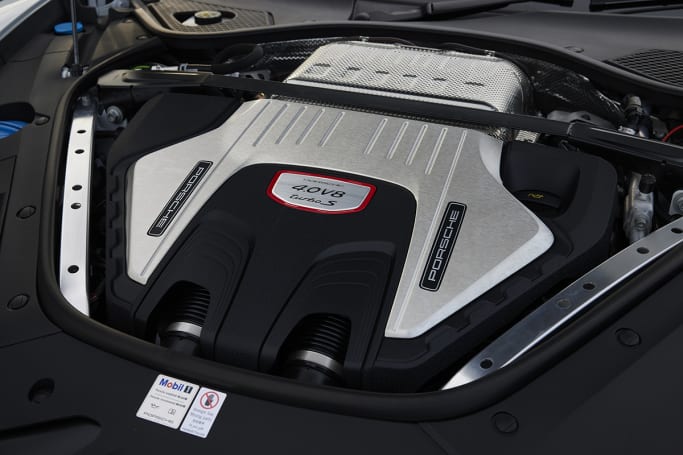
Interestingly, despite the extra power and torque, the Turbo S E-Hybrid isn’t the fastest accelerating Panamera. The lighter Turbo S does the 0-100km/h sprint in 3.1 seconds, while the Hybrid takes 3.2 seconds.
However, the 4S E-Hybrid does manage to out-accelerate the GTS despite using the V6 engine, taking just 3.7 seconds compared to the 3.9 seconds it takes the V8-powered GTS.
But even the entry-level Panamera still does a very rapid 5.6 second 0-100km/h dash, so none of the range can be called slow.
We didn’t get a chance to test all the variants and run the numbers against Porsche’s claims. Again, in an unsurprising development the hugely diverse range of powertrains leads to a wide spread of fuel economy numbers.
The leader of the pack is the 4 E-Hybrid which uses just 2.6 litres per 100km, according to the company, just ahead of the 4S E-Hybrid with a 2.7L/100km claim. Despite all of its performance the Turbo S E-Hybrid still manages to return a claimed 3.2L/100km.
The entry-level Panamera we spent the majority of the time in uses a claimed 9.2L/100km. The Panamera GTS is the least-efficient, with a claimed 11.7L/100km return, which puts it ahead of the Turbo S and its 11.6L/100km figure.
ANCAP hasn’t tested the Panamera, most likely due to the substantial costs involved with crashing half a dozen sports sedans but its limited market probably factors in too, so there’s no crash test score.
Autonomous emergency braking is standard, as part of what the brand calls its ‘Warn and Brake Assist’ system. It can not only detect potential collisions with cars, using the forward camera, but also mitigates against cyclists and pedestrians.
Porsche has included plenty of other standard safety features including 'Lane Keeping Assist', adaptive cruise control, 'Park Assist' with surround view cameras and a head-up display.
Notably, Porsche doesn’t offer its mild-autonomous functionality, 'Traffic Jam Assist', as standard; instead it’s an $830 option across the range.
Another significant safety optional extra is night vision - or 'Night View Assist', as Porsche calls it - which will add $5370 to the cost.
Basic Warranty
3 years / unlimited km warranty
ANCAP Safety Rating

Service intervals are annually or every 15,000km (whichever comes first) for routine oil changes, with every second year a more significant inspection.
Prices vary state-to-state due to different labour costs, but as an indication Victorian residents pay $695 for the annual oil change, while the inspection costs $995.
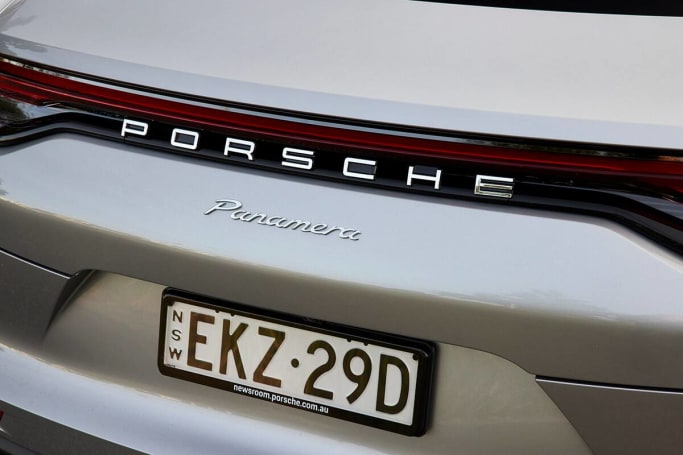
There are other notable charges you should factor in, including brake fluid every two years for $270, while every four years you need to change spark plugs, transmission oil and air filters which add up to an extra $2129, on top of the $995.
The Panamera is covered by Porsche’s typical three-year warranty/unlimited kilometre, which used to be the industry standard but is increasingly becoming less typical.
This is where the Panamera really excels. With every vehicle it builds, Porsche works to make it drive as close to a sports car as possible, even if it's an SUV or, in this case, a large, luxury sedan.
Although Porsche has an extensive range, our test drive was primarily focused on the entry-level model. That’s no bad thing as it’s likely to be the biggest seller in the range, but also because it’s an excellent example of a sports sedan done well.
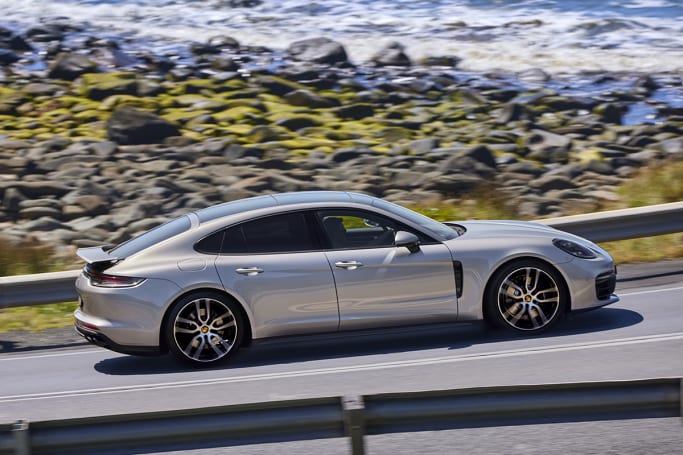
It may be the first rung on the ladder, but the Panamera doesn’t feel like it's basic or missing anything important. The engine is a gem, the chassis is well sorted and the standard equipment level of Australian models is higher than average.
The 2.9-litre V6 twin-turbo makes a nice noise, a melodious V6 burble, and delivers plenty of punch when needed. Even though it tips the scales at more than 1800kg the V6 with its 450Nm of torque helps punch it out of corners with intent.
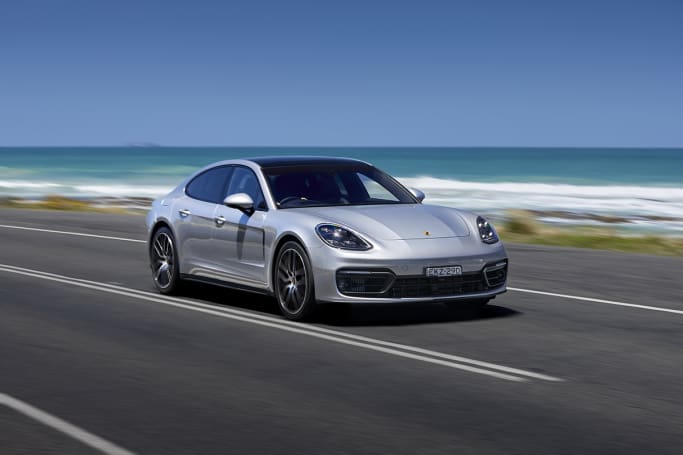
The corners is where the Panamera really shines. Even by the highest sports sedan standards the Panamera is a class-leader thanks to all of Porsche’s decades of know-how being poured into its development.
Point the Panamera at a bend and the nose responds with the kind of precision you expect from a sports car.
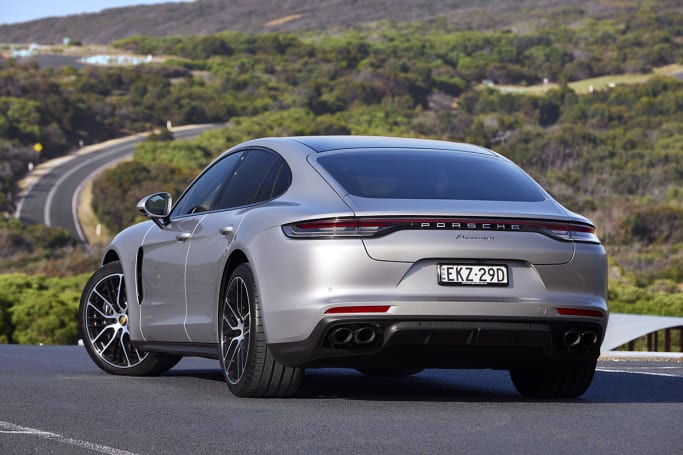
The steering provides accuracy and loads of feedback, so you can place the car accurately despite its size.
You do notice its size and weight as you get into the middle of the corner, but that’s no different from any of its rivals as you can’t fight physics. But for a luxury sports sedan, the Panamera is a star.
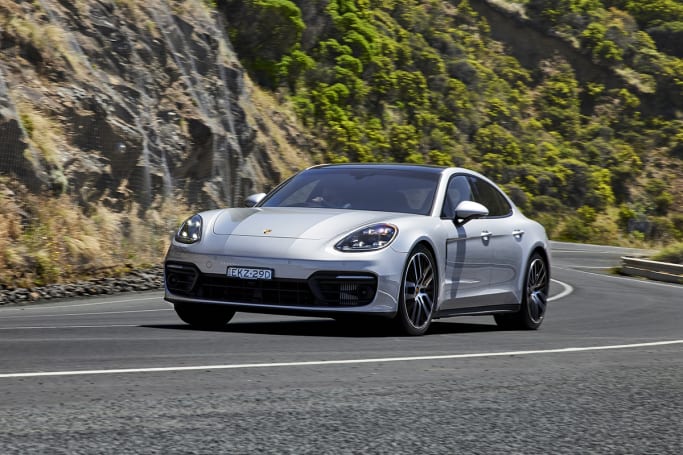
To add another layer to its appeal, the Panamera rides with excellent poise and comfort despite its sporting nature.
Often sports sedans tend to focus too much on handling and stiffer suspension settings at the expense of ride comfort, but Porsche has managed to strike a great balance between the two seemingly opposing characteristics.
While we didn’t get to sample the full breadth of the range, our time in the base Panamera demonstrated that while it’s the most overlooked member of the Porsche family it might also be the most under-rated.
While it may not be the most spacious luxury sedan it does offer ample space and combines it with performance and handling that’s hard to beat. The price drop should help make it a more appealing prospect, although at nearly $200,000 it’s still clearly a premium prospect for a lucky few.
| Vehicle | Specs | Price* | |
|---|---|---|---|
| (base) | 2.9L, PULP, 8 SP AUTO | $169,620 – 194,920 | 2021 Porsche Panamera 2021 (base) Pricing and Specs |
| 4 | 2.9L, PULP, 8 SP AUTO | $178,310 – 204,930 | 2021 Porsche Panamera 2021 4 Pricing and Specs |
| 4 E-Hybrid Executive | 2.9L, Hyb/PULP, 8 SP AUTO | $217,140 – 249,590 | 2021 Porsche Panamera 2021 4 E-Hybrid Executive Pricing and Specs |
| 4 Sport Turismo | 2.9L, PULP, 8 SP AUTO | $184,470 – 212,080 | 2021 Porsche Panamera 2021 4 Sport Turismo Pricing and Specs |
| Price and features | 8 |
|---|---|
| Design | 8 |
| Practicality | 7 |
| Under the bonnet | 9 |
| Efficiency | 7 |
| Safety | 8 |
| Ownership | 6 |
| Driving | 9 |
$169,620
Lowest price, based on third party pricing data